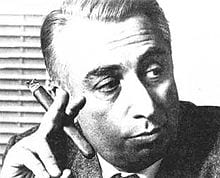By Dr. Paolo Vargiu, Lecturer in Law (University of Leicester)
 Roland Barthes was never particularly interested in the law. Were he alive today, however, it is hard to imagine that he would be a strong supporter of a regime like investment arbitration – a system which, in spite of its best original intentions, has long been exposed by its critics for the lack of balance in rights and obligations and the abuse of the mechanism to increase the already disproportionate power of multinational corporations vis-à-vis the state where they invest. However, his literary production can nonetheless serve as a model for inquiring on aspects of the investment arbitral regime that remain somehow at the margins of the scholarly critique.
Roland Barthes was never particularly interested in the law. Were he alive today, however, it is hard to imagine that he would be a strong supporter of a regime like investment arbitration – a system which, in spite of its best original intentions, has long been exposed by its critics for the lack of balance in rights and obligations and the abuse of the mechanism to increase the already disproportionate power of multinational corporations vis-à-vis the state where they invest. However, his literary production can nonetheless serve as a model for inquiring on aspects of the investment arbitral regime that remain somehow at the margins of the scholarly critique.
In his essay “Writers, Intellectuals, Teachers” (1971), Barthes theorised an imaginary contract between teachers and students, with specific tasks and expectations brought into the contractual relationship by both parties. Barthes’ teachers are neither mere providers of information nor simply the means used by the school to educate students: instead, they are at once erudite, educators, mentors, instructors and tutors. The term magister may be more appropriate to define Barthes’ teachers for they carry the burden to not only instruct on specific tasks, but also to represent schools of thought, and to act as guides, almost gurus, towards enlightenment, knowledge, and skill. They are vested, in other words, with the duty of developing the community they guide; and, rather than self-conferred, it is a duty given to them by such community. (more…)
